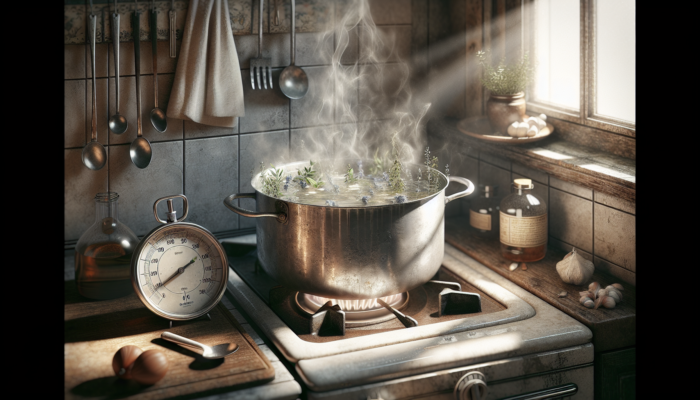Essential Techniques for Selecting the Most Beneficial Herbs to Craft Herbal Syrups for Cold Relief
Discover the Top UK Herbs that Effectively Alleviate Cold Symptoms

Creating herbal syrups specifically designed for cold relief entails a profound understanding of the rich variety of flora present in the United Kingdom. Many herbs exhibit extraordinary characteristics that can significantly ease cold symptoms. Notably, elderberry is celebrated for its capacity to diminish both the length and intensity of cold-related discomfort. Packed with antioxidants, this remarkable herb greatly enhances the immune system, providing relief to the respiratory tract. Similarly, thyme is esteemed for its strong antiseptic properties, making it a favored home remedy for alleviating coughs throughout the UK. Furthermore, Echinacea is recognized for its ability to boost the body’s immune response, rendering it an indispensable element in any herbal syrup formulation.
For those eager to develop herbal syrups for cold relief, comprehensively understanding the unique advantages these herbs offer is crucial. Elderflower, often included in elderberry formulations, is well-appreciated for its diaphoretic</b properties, which encourage sweating to alleviate fevers associated with colds. While thyme is readily available in many home gardens, it can also be foraged from wild areas, presenting an enriching opportunity for individuals interested in enhancing their herbal knowledge and connecting with local ecosystems.
Locating Fresh and High-Quality Herbs in Your Local Community
Finding fresh or dried herbs across the UK can be an enriching adventure for herbal enthusiasts. Local markets that prioritize organic produce frequently feature a diverse array of herbs ideal for making herbal syrups for cold relief. Specialty shops focused on herbal remedies and natural health stores usually carry top-quality dried herbs, ensuring that your syrups retain both potency and flavor, resulting in delightful and effective products.
Foraging for herbs like thyme and wild garlic in the countryside is a joyous pursuit for nature lovers, fostering a direct connection to the land and its plentiful resources. Additionally, the advent of online marketplaces has transformed how herbs are sourced, with numerous vendors providing organic and sustainably cultivated options. By supporting local growers, you not only strengthen community economies but also guarantee fresh, high-quality herbs that significantly enhance your syrup-making efforts.
Gaining Insight into the Distinctive Properties of Key Herbs for Cold Relief
A comprehensive understanding of herbal remedies necessitates recognizing their individual properties. Elderberry, for instance, is known for its ability to inhibit viral replication, making it especially beneficial during cold and flu seasons. Research has demonstrated that elderberry extracts can significantly shorten the duration of cold symptoms, establishing it as a preferred option among herbalists and natural health advocates.
Conversely, thyme is revered for its potent antimicrobial properties, which help combat various pathogens that may exacerbate cold symptoms. Its active compounds, such as thymol, are recognized for their role in supporting respiratory health by aiding in the expulsion of congestion. By understanding these vital properties, individuals can make informed decisions while crafting herbal syrups for cold relief, ensuring that the herbs chosen will deliver the desired therapeutic effects. Additionally, Echinacea is well-regarded for its ability to boost immunity, with studies indicating that proactive use may reduce the likelihood of developing colds. This knowledge empowers individuals to create effective remedies tailored to their specific health needs.
A Comprehensive Guide to Crafting Herbal Remedies at Home

Creating herbal remedies within the comfort of your home can be an enjoyable and fulfilling process. The craft of making herbal syrups involves a few straightforward techniques. One effective method is to prepare herbal teas by steeping your selected herbs in hot water, allowing their beneficial compounds to infuse into the liquid. This infusion can be sweetened with natural ingredients like honey or maple syrup, resulting in a soothing syrup that is not only therapeutic but also enjoyable to consume.
For those seeking a more concentrated solution, tinctures can be created by soaking herbs in alcohol or vinegar. This method extracts a wider range of compounds, resulting in a potent remedy for alleviating cold symptoms. By mastering these preparation techniques, anyone can successfully produce herbal syrups for cold relief, providing natural remedies for themselves and their loved ones while promoting overall wellness.
Establishing the Fundamental Syrup for Herbal Remedies
Selecting the Optimal Sweetener for Your Herbal Syrup
The choice of sweetener plays a pivotal role when crafting herbal syrups for cold relief. Honey, particularly local varieties, is often deemed the best option due to its natural antibacterial properties and soothing effects on the throat. Raw honey, in particular, retains a higher concentration of beneficial compounds, making it a superior choice for syrup formulations.
Alternatively, maple syrup serves as an excellent vegan substitute. It adds a unique flavor to syrups while providing essential minerals and being more digestible than refined sugars. When selecting a sweetener, it is crucial to consider personal taste preferences and dietary restrictions to ensure that the end product is both effective and enjoyable for everyone.
Experimenting with different sweeteners can lead to distinctive flavor profiles in your syrups, allowing for culinary creativity while still preserving the health benefits of herbal remedies. Using sweeteners wisely can enhance the efficacy of the herbs, resulting in a delightful remedy that appeals to individuals of all ages, making the consumption experience both enjoyable and beneficial.
Mastering Boiling and Simmering Techniques for Optimal Herbal Extraction

Mastering boiling and simmering techniques is crucial for extracting the maximum benefits from your selected herbs. Begin by bringing fresh water to a boil before adding the herbs, allowing the temperature to decrease slightly to achieve a gentle simmer. This careful approach preserves the delicate flavors and medicinal properties of the herbs, ensuring that your syrup remains potent and effective.
As a general guideline, it is recommended to simmer the herbal mixture for approximately 30 minutes, stirring occasionally to facilitate the infusion process. This technique guarantees that the beneficial compounds are thoroughly released into the syrup, resulting in a powerful remedy that can effectively relieve cold symptoms. Paying meticulous attention to details—such as monitoring temperature and simmering duration—is vital for creating a successful and effective syrup.
Once the simmering phase is complete, the mixture must be strained to remove the herbs, resulting in a smooth syrup that can be sweetened and stored. Mastering these techniques will greatly enhance your ability to create effective homemade remedies, ensuring they stand out in terms of flavor and health benefits.
Achieving the Perfect Texture and Consistency for Your Herbal Syrup
Achieving the ideal syrup consistency requires a delicate balance between thickness and pourability, which is essential for both taste and medicinal efficacy. To obtain the desired texture, one must carefully consider the ratio of liquid to sweetener. A good starting point is a 1:1 ratio of herbal infusion to sweetener, adjusting according to personal preference and the specific characteristics of the herbs used.
Cooking the syrup for an extended period can also contribute to thickening; however, it is vital to proceed with caution to avoid overcooking, which may negatively impact the flavor. A simple yet effective method for determining the right consistency involves dipping a spoon into the syrup; if it coats the back of the spoon, you are likely within the appropriate range.
Experimenting with various cooking times and ratios allows for a customized syrup that meets individual tastes and health needs. Achieving the perfect consistency not only enhances the enjoyment of the syrup but also ensures its effectiveness in alleviating cold symptoms, making it a valuable addition to your natural medicine cabinet.
Strategies for Infusing Herbs into Your Syrup for Maximum Health Benefits
Employing Cold Infusion Methods for Gentle Extraction of Herbal Properties
Cold infusion is a gentle method that facilitates the extraction of herbal essences without the risk of degrading delicate compounds present in the herbs. This technique involves placing the chosen herbs in cold water and allowing them to steep for several hours or overnight, resulting in a soothing herbal infusion that retains maximum flavor and benefits.
A popular method in the UK involves gradually filling a jar with herbs and cold water before refrigerating it to extract flavors and beneficial properties. This approach is particularly advantageous for herbs like chamomile or lemon verbena, which release their properties gently without the application of heat. The outcome is a refreshing herbal infusion that can be sweetened to create a delightful syrup.
Cold-infused syrups often exhibit a distinct flavor profile compared to their hot-infused counterparts, offering a unique tasting experience. The subtlety of flavors can be especially enjoyable when paired with citrus or spices, inviting creativity in flavor combinations. This method is perfect for those seeking a delicate and refreshing syrup that can be enjoyed throughout the day.
Utilizing Hot Infusion Techniques for Rapid and Effective Extraction
Hot infusion techniques provide a quick and effective way to extract beneficial properties from herbs. This method involves bringing water to a boil before adding the herbs, allowing maximum extraction of flavors and nutrients, resulting in a concentrated herbal infusion.
A common practice involves simmering the mixture for 30 to 40 minutes, enabling the water to fully absorb the herbal qualities. Straining the mixture afterward yields a potent herbal infusion, which can then be sweetened to form a syrup. This approach is particularly valuable when time is of the essence, allowing for swift preparation without sacrificing potency.
Hot infusions are highly adaptable, inviting experimentation with various herbs and additional ingredients. The rapid extraction process makes it ideal for those looking to craft herbal syrups for cold relief on the go, providing essential relief precisely when needed.
Finding the Balance Between Flavor and Potency in Your Syrups
Striking the right balance between flavor and potency is vital for creating an enjoyable syrup that effectively alleviates cold symptoms. Choosing herbs that complement each other can enhance both taste and health benefits. For example, pairing thyme with lemon can create a refreshing and zesty flavor profile while amplifying the medicinal properties of both components.
Adjusting the quantity of sweetener is also crucial in achieving this balance. Excessive sweetness may overpower the herbal flavors, while too little can result in an unpalatable taste. The key is to taste and adjust throughout the syrup-making process, ensuring that both flavor and medicinal qualities are satisfying and balanced.
Moreover, taking individual preferences into account is essential; some may prefer a spicier syrup, while others might favor a more subtle approach. Encouraging experimentation allows for a personalized syrup that caters to diverse taste preferences while effectively relieving cold symptoms.
Enhancing Your Herbal Syrups with Complementary Ingredients for Increased Benefits
Integrating Citrus Fruits into Your Syrup for Added Nutritional Advantages
Incorporating citrus fruits, such as lemons and oranges, into your herbal syrups for colds not only enhances the flavor profile with their bright, zesty notes but also provides a natural source of vitamin C, essential for bolstering the immune system.
Adding freshly squeezed juice or zest from citrus fruits to the herbal infusion during syrup preparation amplifies the syrup’s flavor while enriching its nutritional content. The acidic nature of citrus can help balance the syrup’s sweetness, resulting in a harmonious blend that is both delicious and beneficial for overall health.
Given the year-round availability of citrus fruits in the UK, incorporating these ingredients into your syrups can yield delightful variations that appeal to the palate. Additionally, the vibrant colors of citrus fruits can make your syrups visually enticing, enhancing the overall experience for family and friends when serving them.
Incorporating Spices to Elevate Flavor and Provide Additional Health Benefits
Adding spices to your herbal syrups can significantly enhance their flavor while also providing additional health benefits. Ginger is a particularly potent addition, recognized for its anti-inflammatory properties and ability to soothe a sore throat. Its warm, spicy flavor complements many herbs beautifully, making it a versatile ingredient in syrup formulations.
Cinnamon is another excellent choice, often utilized for its warming properties and its capacity to support the immune system. The aromatic qualities of cinnamon enhance the overall sensory experience of your syrup, making it more enjoyable to consume while providing extra therapeutic benefits.
When incorporating spices, it is advisable to start with small amounts, gradually increasing to suit your taste preferences. The goal is to create a syrup that is not only effective in alleviating cold symptoms but also enjoyable to consume, encouraging regular use during cold and flu seasons.
Enhancing Your Syrup with Essential Oils for Maximum Effectiveness
Essential oils can significantly elevate your herbal syrups, offering concentrated advantages that beautifully complement the herbs being utilized. Oils such as eucalyptus and peppermint are particularly effective for alleviating respiratory symptoms linked to colds, enhancing the overall therapeutic properties of your syrup.
When using essential oils, it is crucial to select food-grade oils to ensure their safety for consumption. Just a few drops can greatly enhance your syrup’s flavor and health benefits, making it even more effective.
The refreshing, minty aroma of peppermint provides a comforting sensation, while eucalyptus oil is renowned for its ability to clear congested airways. These oils can transform a simple herbal syrup into a potent remedy for cold symptoms, making them invaluable additions to your syrup-making toolkit.
Effective Techniques for Storing and Preserving Your Herbal Syrups
Selecting the Best Containers for Storing Your Herbal Syrups
Proper storage of herbal syrups for colds is essential for maintaining their freshness and potency. Choosing the right containers is the first critical step, with glass jars or bottles being ideal due to their non-reactive properties and their ability to preserve the syrup’s quality.
Opting for dark glass containers can further shield the syrup from light exposure, which can degrade its quality over time. Ensure that any container is thoroughly cleaned and sterilized before use to prevent contamination, which could lead to spoilage and compromise the syrup’s effectiveness.
Consider using smaller containers for easier access and quicker consumption, helping the syrup remain fresh for extended periods. Adhering to proper storage practices is crucial in preserving the flavors and medicinal qualities of your syrups, allowing you to enjoy their benefits throughout the cold season and beyond.
Implementing Refrigeration and Freezing Techniques to Extend Shelf Life
Refrigeration is vital for prolonging the shelf life of your herbal syrups. Most syrups can safely be stored in the fridge for several weeks, but for longer preservation, consider freezing them in ice cube trays. This method allows for portion control and convenient access, enabling you to thaw only what you need when cold symptoms arise.
When freezing, ensure that the syrup has cooled completely before pouring it into containers. Leave some room at the top of the containers, as liquids tend to expand when frozen. Once frozen, transfer the cubes to a labeled airtight bag or container for easy identification and accessibility.
This freezing technique preserves the syrup’s flavor while providing a readily available stock of remedies for when cold symptoms occur, making it a practical solution for anyone interested in crafting herbal syrups for colds.
Implementing Labelling and Dating Practices for Quality Control and Safety
Labelling and dating your syrups is not merely a best practice; it is crucial for ensuring safety and freshness. Each container should clearly state the syrup’s name, its preparation date, and any notable ingredients. This information helps track usage and ensures that the syrup is consumed within its optimal timeframe.
Using waterproof labels can prevent information from smudging or fading over time, maintaining clarity for future reference. Additionally, consider incorporating a “use by” date that reflects the expected shelf life of the syrup based on its ingredients and storage conditions.
Proper labelling not only aids in maintaining quality but also prevents accidental consumption of expired products, ensuring that you can rely on your homemade remedies when they are most needed.
Mastering Sterilization Techniques for Optimal Preservation of Your Syrups
Sterilization is a vital step in preparing herbal syrups, essential for preventing spoilage and preserving quality. Several effective methods can be employed to sterilize both the containers and the syrup. A common technique involves boiling glass jars and lids in water for at least 10 minutes, ensuring that all surfaces are thoroughly cleansed and free from contaminants.
Alternatively, running jars through a dishwasher on a hot cycle can effectively sterilize them as well. Once the jars have been sterilized, allow them to cool before filling them with syrup, as pouring hot syrup into cool containers can lead to cracking or breakage.
Understanding and implementing sterilization techniques will ensure that your herbal syrups for colds remain potent and safe for consumption, providing peace of mind as you enjoy the fruits of your labor.
Guidelines for Dosage and Safe Administration of Herbal Syrups
Calculating the Appropriate Dosage for Various Age Groups
Determining the correct dosage of your herbal syrups is crucial, especially when considering different age groups. For adults, a standard dosage may range from one to two tablespoons per day, contingent on the syrup’s strength and the severity of the symptoms being treated.
For children, the dosage should be adjusted downward, typically to one teaspoon for those aged 6 to 12 and to half a teaspoon for younger children. It is always recommended to consult with a healthcare professional to ensure that the dosages are safe and appropriate for each individual’s needs.
Monitoring the response to the syrup is equally important; if symptoms worsen or fail to improve, it is wise to reassess the dosage or seek medical advice. Understanding the nuances of dosage will enhance the effectiveness of your homemade remedies, ensuring they fulfill their intended purpose in alleviating cold symptoms.
Ensuring Safe Administration of Herbal Syrups
When administering herbal syrups, safety should always take precedence. To prevent accidental ingestion, syrups must be stored securely, out of reach of children. Using a measuring spoon to dispense the syrup helps ensure consistent dosing, thereby reducing the likelihood of excessive amounts being taken.
Individuals with allergies or underlying health conditions should exercise caution and consult with a healthcare provider before using herbal remedies. Additionally, pregnant or breastfeeding women are advised to seek professional guidance, as some herbs may not be suitable during these periods.
Understanding safe administration practices will maximize the benefits of your crafted syrups while minimizing risks, allowing individuals to enjoy the natural relief they offer without safety concerns.
Tracking the Effectiveness of Your Herbal Syrups for Optimal Results
Monitoring the effectiveness of your herbal syrups is essential for evaluating their impact on symptom relief. Keeping a simple health journal can help you track the onset of symptoms, the dosage taken, and any changes observed over time. This practice can provide valuable insights into how well the syrup works and inform any necessary adjustments to the formulation or dosage.
If symptoms persist or worsen, it is vital to seek medical advice rather than relying solely on home remedies. Herbal syrups are designed to complement conventional treatments and should not replace professional medical care, ensuring a holistic approach to health.
By observing and documenting responses to herbal syrups, you can refine your approach and ensure that your crafted remedies provide the intended relief and support during cold seasons and beyond.
Adjusting Dosage for Individuals with Specific Health Conditions
Modifying syrup dosages for individuals with specific health conditions is crucial for safety and efficacy. For instance, those with diabetes should consider using lower amounts of sweeteners or opting for sugar-free alternatives to manage their sugar intake effectively. Individuals with respiratory issues may require different herbs or doses, depending on their health status and any concurrent treatments they receive.
Consulting with a healthcare professional is highly recommended when adjusting dosages, especially for those on medication, as certain herbs can interact with pharmaceutical treatments. Understanding how to tailor dosages ensures that herbal syrups remain effective and safe for all intended users, promoting optimal health outcomes.
Staying informed and proactive in adjusting dosages is essential for maximizing the benefits of your crafting herbal syrups for colds journey, allowing for personalized remedies that cater to diverse health needs and preferences.
Proper Storage Practices for Longevity and Quality of Herbal Syrups
Effectively storing herbal syrups is fundamental to preserving their efficacy over time. Keeping syrups in a cool, dark place, such as a pantry or refrigerator, significantly extends their shelf life. To ensure quality when storing syrups, always check for signs of spoilage, such as changes in color, odor, or taste.
Utilizing labeled containers with clear expiry dates helps prevent accidental consumption of old syrups, ensuring that you always use fresh and effective remedies. Regularly rotating your stock ensures that older syrups are consumed first, thereby reducing waste and maximizing the utility of your crafted syrups throughout the year.
By adhering to best storage practices, you can fully enjoy the benefits of your homemade herbal syrups for colds throughout the year, ensuring that they remain effective and safe for consumption at all times.
Common Questions Regarding Herbal Syrups and Their Uses
Which herbs are most effective for creating syrups that alleviate cold symptoms?
Particularly effective common herbs include elderberry, thyme, and Echinacea. These herbs are renowned for their cold-fighting properties and are readily accessible in the UK.
How can I determine if my herbal syrup is still safe to use?
To assess the quality of your syrup, check for any changes in color, odor, or taste. If there are any signs of spoilage, it is best to discard the syrup to ensure safety.
Are herbal syrups safe for children to consume?
Yes, herbal syrups can be safe for children; however, dosages must be adjusted according to age. It is always advisable to consult a healthcare provider for specific recommendations tailored to children.
What is the typical shelf life of homemade herbal syrups?
When stored in the refrigerator, homemade herbal syrups usually last several weeks. For longer preservation, consider freezing them to extend their usability.
What types of sweeteners can I use in herbal syrups?
Honey and maple syrup are popular sweeteners for herbal syrups. Choose sweeteners based on your taste preferences, dietary restrictions, and desired health benefits.
Is it safe to forage for herbs in the wild?
Yes, foraging can be safe, provided you have proper knowledge of herb identification and understand local regulations. Some plants may be toxic, so thorough knowledge is essential for safe foraging practices.
Can dried herbs be used to create syrups?
Absolutely! Dried herbs can be just as effective as fresh ones and are often more convenient, making them an excellent option for syrup-making.
How should I adjust dosages for individuals with specific health conditions?
It is advisable to consult with a healthcare professional to determine appropriate dosages, especially for individuals with specific health issues or those on medication, as certain herbs may interact with pharmaceutical treatments.
What is the process of cold infusion?
Cold infusion is a method that involves steeping herbs in cold water for several hours. This allows delicate flavors and beneficial properties to be extracted without the application of heat.
Can I enhance my herbal syrup with spices?
Yes, spices such as ginger and cinnamon can significantly enhance your herbal syrups’ flavor and health benefits, making them even more enjoyable and effective.
Connect with us on Facebook!
The Article: Crafting Herbal Syrups for Colds: A Winter Wellness Guide appeared first on https://mcrtherapies.co.uk
The Article Herbal Syrups for Colds: Your Guide to Winter Wellness appeared first on https://mcrtherapies.com
The Article Herbal Syrups for Colds: Essential Tips for Winter Health Was Found On https://limitsofstrategy.com

